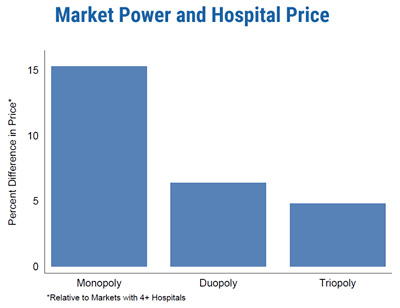Regular readers of this blog should know that when it comes to the price of hospital care, it’s competition that matters, not insurance companies. In areas with only a single hospital, insurance companies have no leverage and have to accept whatever price the hospital charges. If there are lots of hospitals, they have to compete with each other to earn the insurance company’s business.
But in case you’re still skeptical, a team of researchers has analyzed a huge database of health care claims in the US to check this out. They found enormous regional  variation in hospital costs for the same procedure, and one of the biggest drivers of this variation was competition:
variation in hospital costs for the same procedure, and one of the biggest drivers of this variation was competition:
Hospital market structure stands out as one of the most important factors associated with higher prices, even after controlling for costs and clinical quality. We find that hospitals located in monopoly markets have prices that are about 15.3 percent higher than hospitals located in markets with four or more providers. This result is robust across multiple measures of market structure and is consistent in states where the HCCI data contributors (and/or Blue Cross Blue Shield insurers) have high and low coverage rates.
The researchers also discovered that there was little correlation between Medicare prices and private care prices. Thus, studies that focus on variation in Medicare pricing are missing a big part of the picture. They also may be focusing on the wrong regions: areas that have gotten a lot of attention for their low Medicare prices turn out to have unusually high spending on the privately insured. So what’s the answer?
In terms of policy, our work suggests that vigorous antitrust enforcement is important and that hospital prices could be made more transparent. There is evidence that higher deductibles and cost sharing alone will not likely encourage shopping by patients….However, more information, such as recent efforts in Massachusetts to make hospitals’ prices public, could help patients and their agents make more informed choices over treatment and put downward price pressure on more expensive hospitals in a sector of the economy where consumers (patients) presently know almost nothing about what they or their insurer will pay for care.
The study is based on data from the Health Care Pricing Project. You can read all about it here.













